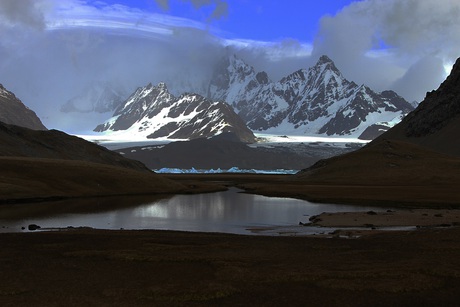Major Antarctic expedition planned

The Swiss Government has announced the creation of the Swiss Polar Institute (SPI) — an interdisciplinary centre that will devote itself to researching the Earth’s poles and other extreme environments. To mark its launch, the SPI is organising a major project: the first scientific expedition to fully sail around Antarctica.
The Antarctic Circumnavigation Expedition (ACE) will visit 13 of the major island groups surrounding the Antarctic continent, all the while measuring and quantifying the impact of climate change and pollution in the Southern Ocean. Set to run from December 2016 to March 2017, the expedition will comprise 55 researchers from 30 countries working on 22 research projects. Australian researchers will lead seven of these projects.
Australian Antarctic Division Principal Research Scientist Dr Dana Bergstrom is set to investigate the impact of microplastics on the Southern Ocean food web. By sampling surface waters for free-floating microplastics, as well as looking for evidence of ingestion by zooplankton, seals and seabirds, Dr Bergstrom’s team will investigate the extent to which microplastics have reached the Southern Ocean ecosystem.
Australian Antarctic Division Marine Mammal Acoustician Brian Miller will meanwhile undertake the first circumpolar survey for Antarctic whales in a single voyage, seeking to reverse the currently unknown status of many whale populations. His team will use new instruments and methods to listen to the creatures, which will provide them with data on the distribution of Antarctic, sub-Antarctic and subtropical whales.

Monash University Professor Steven Chown will investigate the terrestrial biodiversity of the Antarctic region and its responses to rapid and extensive environmental change. The findings will help develop new ways to help conserve biodiversity in the Antarctic region, as well as provide innovative tools to help reduce threats to ecosystems from invasive species as a result of climate change. The expedition is also likely to uncover new species of animals and plants.
Australian women will meanwhile join their sisters from around the world in Homeward Bound, which brings together 78 female scientists from across the globe on a journey of empowerment. As they are mentored in leadership practices and come up with strategies to fight climate change, the participants will learn to advance their leadership skills to facilitate change and provide direction in a world where female voices are currently underrepresented.
These are just some of the projects set to take place as part of the expedition, all of which will make use of the most advanced data collection and analysis technologies available. Because they will be run in extreme environments, the projects will provide insight into biochemical compounds and microorganisms that up to now have been studied little if at all. The results could lead to discoveries and applications in the fields of biotechnology, medicine and environmental science.
Breakthrough blood test for endometriosis developed
Scientists identified 10 protein biomarkers, or 'fingerprints' in the blood, that can be...
A simple finger prick can be used to diagnose Alzheimer's
A new study is paving the way for a more accessible method of Alzheimer's testing, requiring...
Experimental blood test detects early-stage pancreatic cancer
The new test works by detecting two sugars — CA199.STRA and CA19-9 — that are...




